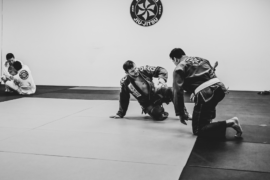Until recently, the Tour de France, the most momentous contest in professional cycling and a headline event in world sports, provided no opportunity for women. The most esteemed female cyclists of the 2010s called for a women’s Tour de France again and again to no avail. Finally, in 2022, with women’s pro cycling gaining rapidly in funding and professionalism, the sea change became impossible to ignore. The Dutch rider Annemiek van Vleuten became champion of the very first Tour de France Femmes Avec Zwift.
Van Vleuten’s victory was something of a foregone conclusion. She had long been in a league of her own on steep mountain roads. She was one of the only women who regularly trained in the thin air of summits a mile or more above sea level, for which her former team christened her “one of the boys.” In 2023, the route of the second Tour de France Femmes Avec Zwift was set to include the Col du Tourmalet, an ascent so long and biting that it had determined more than a few Tour victories on the men’s side. Van Vleuten was on the start line.
And yet, on Saturday, July 29, I wrote in my journal: Demi Vollering just won the Tour de France. She left Van Vleuten behind in the mist on the Col du Tourmalet. The Polish rider Kasia Niewiadoma was up ahead, having gained a gap by riding lines so clean and sharp on the descent that they could have cleft the mountain apart. Vollering was a specter in the fog, climbing, reaching, passing her, shooting to the peak.
After a years-long fight for respect, the women were alone with the mountain.
Last year, Van Vleuten simply rode away from everybody, twice, as if without even breathing hard. She won the Tour along with three other crown jewels of the sport. After that, Vollering gave an offseason interview that was published under the click-worthy headline “I really believe I can beat Annemiek van Vleuten.” It seemed like a prophecy that would be proved wrong for at least a few years until it came true, but I had a feeling she wasn’t talking about the long run. She was talking about the next year. This year, the Tour that was less than seven months away at the time of the interview.
Kasia Niewiadoma later implied that she felt like she had wasted that offseason. Women’s cycling is serious business now, as if it put on a suit and hat one day in December of 2022 and never looked back. Vollering had spent her time away at altitude camp, and Niewiadoma was feeling somewhat wrong-footed for not having done the same. “From now on,” the hatted figure said sternly, “we spare no preparation.”
This year, Demi won the Ardennes triple, a cluster of prestigious one-day races in the spring, and Niewiadoma just couldn’t compete. In harsh truth, she never can; the last time Niewiadoma won a road race was in 2019. Several of her team’s up-and-comers have won races this year, including a breakout performance earlier in this Tour de France, but Niewiadoma has not. She came third in the Tour last year, behind Vollering, who was of course behind Van Vleuten. It was the biggest result of Niewiadoma’s career, but it was yet another third place, and nobody quite thought the podium was repeatable for her.
And yet, this year, she dropped both Vollering and Van Vleuten on the descent before the Tourmalet and went clear. After months and years, Niewiadoma was finally back in her element: ahead of everyone, solo on the big stage, racing with a vengeance to gain the finish line first. Except the big stage was bigger now than it had ever been before, and something new happened: Annemiek van Vleuten never caught her. Niewiadoma even won the maillot à pois, the prize for quick climbing on mountains and molehills across the entire race.
It was Vollering who caught Niewiadoma and won the Tour. Vollering, who was fourteen when Van Vleuten quit her day job at age twenty-eight to become a full-time professional cyclist. In women’s cycling as we have known it, older is usually better; it’s the women with the most experience who get the best results. Last year, Van Vleuten won the Tour at the age of thirty-nine, and it felt completely right. No one could touch her. Thirty-five-year-old Marianne Vos, often called the sport’s greatest of all time, won an equally unsurprising green jersey for sprint victories. The women of great stature of the 2010s were finally getting their recognition at the Tour de France in 2022.
But in this year’s Tour, that era drew to a close. The younger rider has defeated the elder and we have finally entered the 2020s. Vollering cracked Van Vleuten on the Tourmalet and claimed her place on top of the world. As the first Tour winner in this new era of professionalism in women’s cycling, Demi’s personality takes on a great significance.
She, as it turns out, is not afraid to be feminine at the same time as being a champion. Sometimes she cries when she wins and sometimes she cries when she loses. Unlike most of her Dutch compatriots, she gives interviews pulsing with emotion. She painted her nails white before laying down untouchable power on the Col du Tourmalet. She trained at altitude camps because that is what you do when you’re a contender for first place at the Tour, and she didn’t have to be “one of the boys” to do it.
Demi Vollering and her teammates, along with half the women’s peloton, have had to wear pink jerseys for years, like they’re the razors that executives shrink down and price up compared with the same product marketed towards men. That subtle meaning has been deflated now, because Demi took back the pink wrapper when she conquered the Tour de France in it.
The women she defeated in the Tour this summer were riders of unquestionable might. There was Van Vleuten, the unofficial queen of the mountains in years past. There was Kasia Niewiadoma on her precarious but unerring mission for a podium spot and the maillot à pois, which, incidentally, is known as the Queen of the Mountains jersey. But Demi Vollering surpassed them both.
Demi Vollering is all strength and all female, and she is the new Queen of the Tour itself.
JULIA BEA is student of Latin, ancient Greek, and mathematics at Bryn Mawr College. She writes everything from literary analysis to audio fiction and is passionate about welcoming new fans into women’s sports.
Like what you’re reading?
Get new stories, sports musings, or book reviews sent to your inbox. Drop your email below to start >>>
NEW book release
Ghosts Caught on Film by Barrett Bowlin. Order the book of which Dan Chaon says “is a thrilling first collection that marks a beginning for a major talent.”
GET THE BOOK



